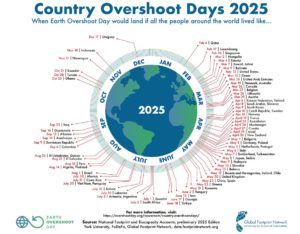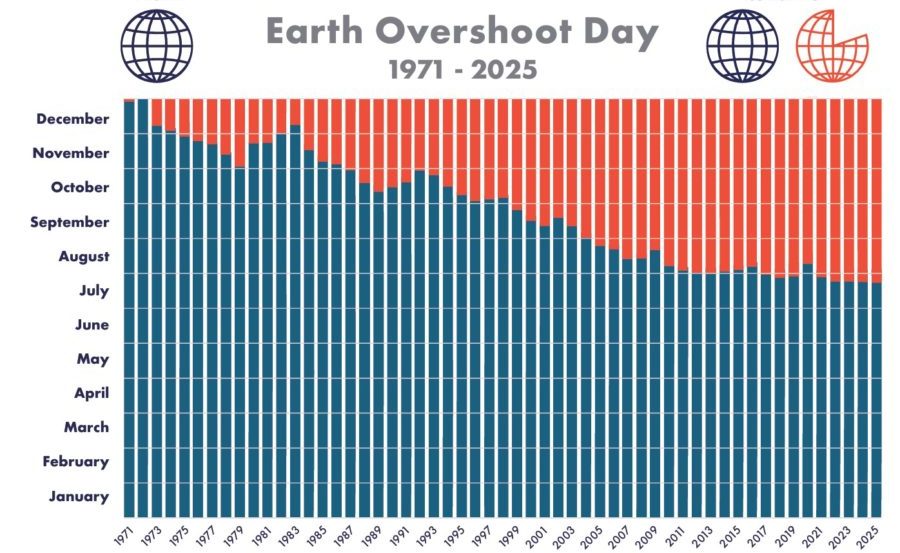In July, humanity will exhaust its natural resources for the entire year 2025. Overshoot Day in Romania: we have been living on ecological debt since May
Humanity will enter ecological deficit one week earlier than last year, according to data published by the Global Footprint Network, the international organization that calculates each year the Earth Overshoot Day. More precisely, Overshoot Day will fall on July 24. As for Romania’s Overshoot Day, our country has been living “on ecological debt” since May 31.

Overshoot Day marks the moment when the demand for ecological resources and services in a year exceeds what the Earth can regenerate in that same year. Practically, after this date, humanity lives by depleting natural capital, further eroding the biosphere. Everything consumed on Earth during this period – food, energy, raw materials – is taken at the expense of the resources “allocated” to future generations, according to experts from the Global Footprint Network.
According to measurements, if in the 1970s Overshoot Day fell in December, the situation has gradually deteriorated, so that in the last 5 years the planet’s ecological resources have been consumed already by July.
“The bad news is that humanity consumes far beyond the planet’s regenerative capacity. Excessive consumption of natural resources brings us closer each year to major ecological imbalances, and the fact that Overshoot Day comes earlier and earlier is a clear signal that the current economic model is no longer sustainable. In this context, it is essential to analyze our consumption habits and act where we can generate a rapid and significant impact. A concrete example is electrical and electronic equipment – products indispensable in everyday life, but whose proper recycling directly contributes to resource conservation and environmental protection. The good news is that solutions exist, they are within our reach, and recycling this equipment is one of the most effective. We already have the infrastructure in place – what’s missing is only the conscious decision to use it,” said Roxana Puia, Marketing Director of the Environ Association, an organization managing producer responsibility in the field of waste electrical and electronic equipment.
According to the Environ Association, in 2022 humanity generated 62 million tons of waste electrical and electronic equipment (WEEE), of which only 22.3% was properly collected and recycled. EU countries perform better than the global average, with 40.1% of e-waste collected and recycled. In Romania, the collection rate was 45.4%, with an average of about 7.7 kg per capita.
Overshoot Day in Romania – we consume resources two months earlier than the world average
This year, Romania reached its Overshoot Day almost two months earlier. More precisely, our country has been living on ecological debt since May 31. Compared to last year, when Romania exhausted its resources on July 20, this represents a significant setback in terms of sustainability.
In a ranking of the countries most mindful of natural resources, Romania is ranked 34th, right after Hungary, which reached its Overshoot Day on June 2, and before Greece (May 25). At the top of the list are Uruguay (December 17), Indonesia (November 18), and Nicaragua (November 11). Among European countries, the best placed is Albania (September 13).
The most “indebted” countries, meaning those that consume natural resources at an alarming rate, according to data from the Global Footprint Network, are Qatar (February 6), Luxembourg (February 17), and Singapore (February 26). Other countries with high ecological debt include the USA (March 13), Denmark and Australia (March 19), Canada (March 26), Belgium (March 27), Lithuania (March 28), and Austria (March 29).
What can be done
The Global Footprint Network has calculated that if humanity aimed to delay Overshoot Day by 6 days each year, it could return to living within the ecological limits of the planet by 2050. This is possible through effective public policies, but also through responsible individual behaviors: reducing unnecessary consumption, reusing, recycling, adopting alternative mobility, and choosing local and seasonal products.




